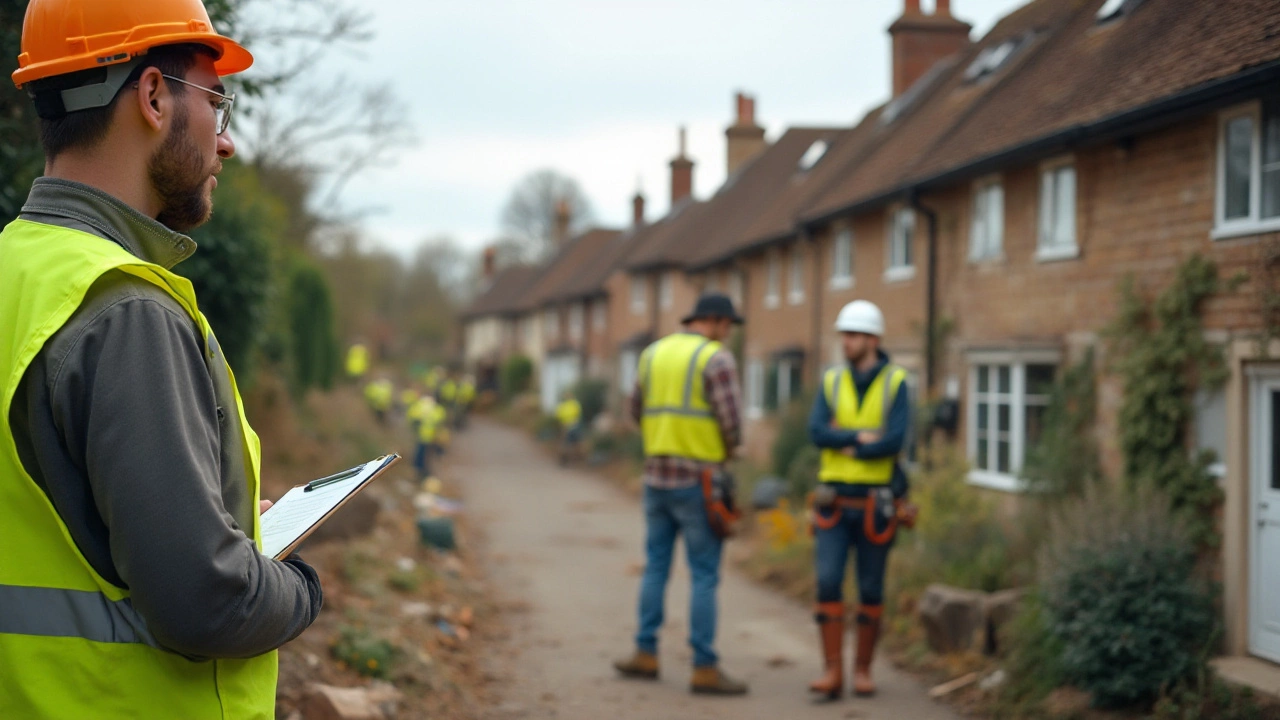
Embarking on a home renovation or building project requires you to find a trustworthy and skilled contractor who can bring your vision to life. However, the task of finding a reputable contractor in your locality can be daunting, with so many options to consider and factors to evaluate.
Before leaping into this challenge, it's essential to arm yourself with knowledge about the necessary credentials and licenses required in your area. Scrutinizing these details helps ensure that you choose a professional who operates above board and adheres to local regulations.
Not only should you verify credentials, but it's also crucial to delve into their past projects and testimonials. This step helps you gauge the quality of their work and their reliability.
In today's digital age, online platforms can be an invaluable tool in your search; they offer a wealth of information about various contractors and customer experiences. But don’t overlook the power of personal recommendations from family and friends, who might have firsthand insights into local craftsmanship.
Once you've narrowed down your list, conducting interviews can be the deciding factor. Here, you assess not just their expertise, but also their readiness to communicate effectively, a vital component of any successful project.
- Understanding Credentials
- Researching Locally
- Evaluating References
- Utilize Online Platforms
- Conducting Interviews
- Making the Final Decision
Understanding Credentials
When you're tasked with selecting a building contractor for your home improvement project, it's crucial to begin by understanding the credentials they need to possess. Recognizing these essentials can not only ensure compliance with local regulations but also safeguard the quality and longevity of your project. First and foremost, a contractor’s license serves as a baseline credential you should verify. Most regions require contractors to hold valid licenses to legally carry out construction work. This license demonstrates that the contractor has met the minimum industry requirements, including passing certain examinations, showcasing experience, and agreeing to adhere to a professional code of ethics. Checking the status of these licenses can often be done through a local government website or department.
An essential aspect of a reputable contractor is their insurance. A professional contractor should carry two specific types of insurance: liability and workers' compensation. Liability insurance protects you from potential damages during the construction process, whereas workers' compensation covers any injuries that workers might sustain on the job. Without this coverage, any accidents that occur might leave you financially liable—a compelling reason to verify these details meticulously. To achieve this, ask the contractor to provide certificates of insurance and validate them with the insurance provider directly.
Another component to look into is the contractor's bond. A bond acts as an agreement that secures compensation if the contractor fails to meet the contractual terms. Being bonded offers you an additional safety net, augmenting both legal and financial protection. It's worthwhile to ensure that any contractor you consider is bonded up to the value of your prospective project.
According to the National Association of Home Builders, 80% of homeowners believe that hiring bonded contractors provides peace of mind, increases trust, and reduces risks significantly.Furthermore, belonging to professional associations or holding certifications can be indicative of a contractor's commitment to their craft. Certifications from bodies like the National Association of the Remodeling Industry (NARI) or the Associated General Contractors (AGC) imply a higher level of industry recognition, alongside ongoing education and training trends.
Additionally, looking at a contractor's track record with previous regulatory compliance can be insightful. Examining whether they have had any history of disciplinary actions or disputes related to building codes can be telling. This history can often be obtained through a local consumer protection agency or the Better Business Bureau. Keep in mind, however, that one or two disputes over a long career may happen to even the best professionals; what matters more is how issues were resolved. Verify this with testimonials or reaching out to past clients when possible.
Researching Locally
When it comes to finding a reputable contractor, tapping into local resources can be incredibly beneficial. There's a certain peace of mind that comes with hiring a contractor who knows the local regulations inside and out, and more importantly, someone who's built a trusted reputation in your community. Start by visiting local hardware stores or home improvement centers, as these businesses often have bulletin boards filled with business cards and flyers from local contractors. The owners or staff at these establishments can be an excellent source of referrals as they frequently interact with contractors.
Another effective strategy is attending local home shows or events where contractors often showcase their work. These gatherings provide an opportunity to meet and interact with potential contractors in person. You’ll be able to ask specific questions about their experience, see examples of their past work, and assess their communication skills firsthand. In addition, local chambers of commerce or trade associations often keep directories of contractors who have committed to ethical business practices. This can be a useful reference when attempting to navigate the crowded field of contractors.
Community word-of-mouth is a powerful tool. Speak to neighbors or friends who have recently had similar work done. Asking them which contractors they used, the quality of work received, and how the contractor addressed issues offers invaluable insight. Personal anecdotes can sometimes reveal the true nature of a contractor's professionalism and workmanship which might not be immediately apparent in an online profile.
Consider leveraging the power of technology by exploring local online forums, such as neighborhood groups on social media platforms. These spaces can be a gold mine of information, displaying honest reviews and experiences from others in your area. Often, you'll find posts describing both exceptional and subpar experiences, giving you a well-rounded picture of who might be the best fit for your needs.
A report by the Better Business Bureau shows that hiring local contractors can lead to higher satisfaction rates because they can address issues quickly and provide personalized service. With this information at hand, constructing a list of qualified and reputable contractors becomes much simpler. Once you compile a list of potential candidates, dig deeper by verifying their credentials with local licensing boards to ensure they are permitted to work within the legal framework required for your project.
"Researching locally not only aids in finding a reputable contractor but also builds a network of reliable professionals who can contribute to your home improvement projects in years to come," explains renowned home renovation expert, Bob Villa.

Evaluating References
When it comes to choosing a reputable contractor for your home improvement project, evaluating references is a crucial step that should not be overlooked. References offer a lens into the contractor's past work, providing invaluable insight into their reliability, professionalism, and skill level. You must approach this task with diligence and a keen eye for detail, focusing on acquiring and verifying the contractor's past clients' opinions and experiences. Start by requesting a list of recently completed projects from the contractor, making sure to include both small and large jobs to get a comprehensive view of their capabilities.
Once you have this list, take the time to contact these references directly. When you speak to them, ask detailed questions about the contractor's work quality, punctuality, and ability to stay within budget. Discussing their experience in person or over the phone will allow you to pick up on verbal cues and nuances that written reviews simply don't convey. Specific questions like "Did the contractor adhere to the scheduled timeline?" or "How did they handle unexpected challenges?" can provide deeper insights into the contractor's problem-solving skills and reliability.
Pay attention to the consistency of the feedback. If several references share similar experiences, whether positive or negative, they likely reflect an accurate picture of the contractor's work ethic. Inconsistencies in their anecdotal experiences might indicate an issue or simply highlight isolated incidents, but these should still be investigated further to understand their context.
As renowned home improvement expert Bob Vila once said, "The most expensive thing you can do is fix someone else's mistakes," accentuating the importance of thorough vetting.
In today's digital age, online reviews can serve as an excellent supplementary resource. Platforms such as Yelp, Houzz, and even Google often have a plethora of reviews detailing people's experiences with contractors. However, treat these virtual testimonials with a healthy dose of skepticism—beware of reviews that seem excessively positive or negative and look for detailed, well-balanced accounts that provide specific instances of the contractor's work. Cross-referencing these reviews with your conversations with direct references ensures that you form a well-rounded view of the contractor's reputation in your community.
Data can further support this evaluation process. A survey by the National Association of the Remodeling Industry found that over 70% of homeowners trust word-of-mouth referrals as their primary source when choosing home improvement services. This statistic highlights the enduring value of personal recommendations in making informed decisions. Include these stats in your analysis as an anchor point for assessing contractor credibility.
Tips for Checking References
When checking references, take notes during each conversation and create a pros and cons list for each contractor. This will help you in comparing them later. Moreover, if possible, visit one of their recent job sites to physically inspect their handiwork and ask current clients about their ongoing satisfaction. These strategic steps can help you confidently move forward with a building contractor that can transform your home.Utilize Online Platforms
In our modern, tech-driven world, embarking on the quest to find a reputable contractor has become alarmingly simpler with the wealth of information available online. When you’re considering local professionals for your remodeling or construction project, online platforms can serve as a goldmine of information and accessibility. These platforms often allow you to filter results by location, experience, and customer ratings, giving you a quick snapshot of what to expect. Websites like Angie's List, HomeAdvisor, and Houzz are well-known names that have developed a reputation for featuring credible and vetted contractors. These platforms actively work alongside a network of professional local contractors, ensuring that every recommendation you receive is reputable and dependable, thereby saving you precious time and potential headaches.
One key benefit of these platforms is the aggregation of verified reviews from former clients. This offers insight into the contractor's work ethos, reliability, and quality—information that is oftentimes directly from the horse's mouth. Additionally, these websites go one step further by providing licensing and background checks, generating a level of transparency that is crucial in building trust. Bruce Kasanoff, a renowned author, aptly noted,
"When people offer you their feedback, they're giving you a gift."User feedback can sometimes reveal more about the service level than the company's website itself. Therefore, a contractor with glowing testimonials and a high number of projects successfully completed is usually a good bet.
Another advantage of utilizing online platforms is the availability of project galleries and portfolios, which help you visualize the type of work a contractor is capable of delivering. This is especially helpful when you have a specific design or functional requirement in mind and need to assess who can best fulfill your vision. Moreover, tech-savvy platforms have started incorporating multimedia, such as video testimonials and 360-degree virtual tours of completed projects. They can give you a comprehensive view of what to expect, sometimes even result in real-time chats or virtual consultations. By using such advanced features, you are essentially narrowing down choices, focusing only on those contractors who have consistently performed well and have a proven track record of enhancing projects similar to yours.
To make this process even more effective, you can leverage multiple platforms simultaneously, cross-referencing information to create a more rounded view. Comparing data and reviews from various sources can quickly highlight any discrepancies or red flags that you need to be aware of. For those who value empirical evidence, some websites offer statistics on contractor performance, satisfaction rates, and even timelines for project completion.
| Platform | Contractor Listings | Average User Rating |
|---|---|---|
| Angie's List | 1,200+ | 4.5 |
| HomeAdvisor | 2,500+ | 4.7 |
| Houzz | 800+ | 4.6 |

Conducting Interviews
Engaging with potential building contractors through interviews is an indispensable step in the process of selecting a perfect match for your project. This face-to-face interaction not only helps you gauge the contractor's expertise but also provides insight into their communication skills and adaptability to your vision. Start by preparing a list of critical questions that address various aspects of the project, such as timeline, budget, material choices, and previous experiences with similar projects. In addition to these standard queries, consider asking about their problem-solving strategies, which will reveal their ability to handle unforeseen challenges.
During the interview, pay close attention to the contractor's communication style. A reputable contractor should be able to explain complex technical aspects in simple terms, ensuring you clearly understand the project's scope and potential pitfalls. This ability indicates not only their expertise but their willingness to work collaboratively with you. Ask them about their typical workflow and how they incorporate client feedback, which can provide valuable insights into their adaptability and commitment to client satisfaction.
Moreover, it's crucial to inquire about their team and sub-contractors. Knowing who will be on-site gives you a better understanding of what to expect daily. You might explore whether the contractor has worked with these professionals before, which can often mean smoother coordination and a more cohesive team. This aspect frequently distinguishes successful projects from those that encounter delays or issues. Mention this to assess the depth of their professional connections and whether they have a reliable network that enhances project efficiency.
"A great contractor offers a partnership, not a transaction," suggests Sarah Anderson, a home renovation expert from the National Association of Remodeling Industry. "They value your input and prioritize openness in every step of the process."Pay attention to their engagement level during your discussion; a contractor who listens and asks probing questions typically shows a genuine interest in the project's success.
Lastly, discussing logistics and contract terms during these interviews is imperative. Carefully examine their availability and ensure it aligns with your timeline, preventing unnecessary delays. Moreover, understanding the specific terms of their contracts can avert future misunderstandings. Discuss warranties, payment schedules, and how changes mid-project are handled. This can create a solid foundation for a trustworthy and professional relationship, ultimately leading to a rewarding experience for both parties.
Making the Final Decision
Deciding on a reputable contractor to handle your project can feel like a leap of faith, but with diligent research and clear communication, you can make an informed choice. Begin with a detailed comparison of the bids you receive. Each contractor will offer a proposal, which should cover not just the cost, but also the timeline and scope of work. Carefully reviewing these proposals can offer insights into their pricing strategies and project management skills. Pay attention to how comprehensively they detail materials, labor, and unforeseen contingencies. It's not uncommon for cheaper quotes to lack sufficient detail, hence possibly glossing over critical areas that could cost you more in the long run.
At this stage, consider having follow-up conversations with your top two or three candidates. It's essential to ask clarifying questions. Topics to cover include how they handle delays or unexpected challenges, what their policies are on revisions, and whether they have ongoing projects that could affect your timeline. During these discussions, gauge their enthusiasm for your project. Are they making insightful suggestions? Do they seem genuinely interested in what you're trying to achieve, or are you just another job on their list?
Matching work styles and personalities between you and the contractor can significantly impact the project's success. Imagine a scenario where communication feels natural, where the contractor anticipates your needs and aligns perfectly with your vision, versus one where every interaction feels frictional and cumbersome. This 'fit' can often dictate the smoothness of the journey and the quality of the outcome. A study by the Home Builders Association found that 78% of homeowners who reported satisfaction with their projects shared a good rapport with their contractors.
Don’t underestimate the power of instinct in making the final decision. Your gut reaction, grounded in substantial research and interaction, can often point you in the right direction. You might remember the words of famed American architect, Frank Lloyd Wright:
“An architect's most useful tools are an eraser at the drafting board and a wrecking bar at the site.”This implies that flexibility and adaptability are as crucial as skill, traits you should seek in a contractor. Once all proposals are clearly outlined and interviews are complete, it can be helpful to sleep on it for a day or so, giving yourself space to digest everything.
Finally, ensure that all terms you agree on are documented in writing. This contract should outline the start and end date, payment schedule, detailed description of the work, and warranties. Having a clear contract protects both parties and helps prevent misunderstandings. This step formalizes your commitment but also serves as a backup should disputes arise. Remember, hire contractor involves more than just the hand you shake; it's about the trust you cultivate and the vision you share.
Here’s a concise checklist to guide your final steps:
- Confirm all permits and legal considerations are accounted for.
- Ensure the contractor provides a lien waiver, protecting you in case they don't pay their own suppliers.
- Discuss a regular update schedule – knowing what progress to expect can ease many anxieties.
- Verify a final walkthrough upon completion is part of the agreement, ensuring satisfaction.
- Keep communication lines open for feedback once the project is underway.
In your quest to find a building contractor who fits, this final decision seals the deal. It’s a choice that can lead to a rewarding transformation of your home or space, setting the stage for years of comfort and aesthetic delight.




